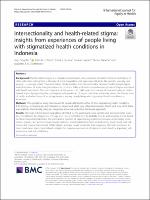Digital health, gender and health equity: invisible imperatives
| Digital health, gender and health equity | |
| Sinha, Chaitali
Schryer-Roy, Anne-Marie |
|
| 2018-12-01 | |
| Journal of Public Health | |
|
A growing body of evidence shows the use of digital technologies in health—referred to as eHealth, mHealth or ‘digital health’—is improving and saving lives in low- and middle-income countries. Despite this prevalent and persistent narrative, very few studies examine its effects on health equity, gender and power dynamics. This journal supplement addresses these invisible imperatives by going beyond traditional measures of coverage, efficacy and cost-effectiveness associated with digital health interventions, to unpack different experiences of health workers and beneficiaries. The collection of papers presents findings from a cohort of implementation research projects in Africa, Asia, Latin America and the Middle East, and two commentaries offer observations from learning-oriented evaluative activities across the entire cohort. The story emerging from this cohort is comprised of three themes: (i) digital health can positively influence health equity; (ii) gender and power analyses are essential; and (iii) digital health can be used to strengthen upward and downward accountability. These findings, at the individual project level and at the level of the cohort, provide encouraging recommendations on how to approach the design, implementation and evaluation of digital health interventions to address the Sustainable Development Goals agenda of leaving no one behind. |
|
| m-Health
eHealth Digital health gender health equity women SDGs Accountability Health systems |
|
| ii1-ii5 p. | |
| journalArticle | |
| application/pdf | |
| © The Author(s) 2018. | |
| Open access | |
| https://resources.equityinitiative.org/handle/ei/477 |
This item appears in the following Collection(s) |
|
|
Collections
|
Related items
Showing items related by title, author, creator and subject.
-
Human resources for health: task shifting to promote basic health service delivery among internally displaced people in ethnic health program service areas in eastern Burma/Myanmar
Low, Sharon; Tun, Kyaw Thura; Mhote, Naw Pue Pue; Htoo, Saw Nay; Maung, Cynthia; Kyaw, Saw Win; Oo, Saw Eh Kalu Shwe; Pocock, Nicola Suyin (2014-09-29)
Background: Burma/Myanmar was controlled by a military regime for over 50 years. Many basic social and protection services have been neglected, specifically in the ethnic areas. Development in these areas was led by the ethnic non-state actors to ensure care and the availability of health services for the communities living in the border ethnic-controlled areas. Political changes in Burma/Myanmar have been ongoing since the end of 2010. Given the ethnic diversity of Burma/Myanmar, many challenges in ensuring health service coverage among all ... -
Can mHealth and eHealth improve management of diabetes and hypertension in a hard-to-reach population? —lessons learned from a process evaluation of digital health to support a peer educator model in Cambodia using the RE-AIM framework
Steinman, Lesley; Pelt, Maurits van; Hen, Heang; Chhea, Chhorvann; Lan, Channe Suy; Te, Vannarath; LoGerfo, James; Fitzpatrick, Annette L. (2020-10-05)
Background: The burden of non-communicable diseases (NCDs) is increasing in low- and middle-income countries (LMICs) where NCDs cause 4:5 deaths, disproportionately affect poorer populations, and carry a large economic burden. Digital interventions can improve NCD management for these hard-to-reach populations with inadequate health systems and high cell-phone coverage; however, there is limited research on whether digital health is reaching this potential. We conducted a process evaluation to understand challenges and successes from a digital ... -
Intersectionality and health-related stigma: insights from experiences of people living with stigmatized health conditions in Indonesia
Rai, Sarju Sing; Peters, Ruth M. H.; Syurina, Elena V.; Irwanto, Irwanto; Naniche, Denise; Zweekhorst, Marjolein B. M. (International Journal for Equity in Health, 2020-12)
Abstract Background Health-related stigma is a complex phenomenon, the experience of which intersects with those of other adversities arising from a diversity of social inequalities and oppressive identities like gender, sexuality, and poverty – a concept called “intersectionality”. Understanding this intersectionality between health-related stigma and other forms of social marginalization can provide a fuller and more comprehensive picture of stigma associated with health conditions. The main objective ...



